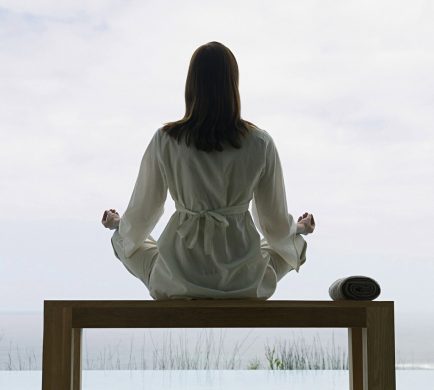I remember the sense of relief I felt when I first heard the concept of a highly sensitive person (HSP) explained to me, as a rush of “OMG, that’s it!” hit me like a lightning bolt. I was 43 years old and finally able to make sense of a way of being in the world that was so different from those around me growing up, especially those in my family of origin. Since I was a child, I remember being accused of being overly sensitive, making mountains out of molehills, being too affected by things in the world that I could not change, and asking too many questions of an existential nature. I remember the stories my parents told of holding a frightened, crying child when they took me to group gatherings. Those social events usually ended in fits of terror for me, and I suspect my parents were often not happy about the toll that parenthood had taken on their social life.
That sense of unexplained “differentness” hung over me from childhood to mid-life until I found validation in the work of psychologist Elaine Aron. “According to Aron’s theory, HSPs are a subset of the population who are high in a personality trait known as sensory-processing sensitivity, or SPS. Those with high levels of SPS display increased emotional sensitivity, stronger reactivity to both external and internal stimuli—pain, hunger, light, and noise—and a complex inner life”
https://www.psychologytoday.com/us/basics/highly-sensitive-person.
To this day, my husband is always amazed at how sensitive I am to loud noises and strong smells and how his moods affect mine. I tend to “get lost in the other” and do not always know where the emotional boundaries are between myself and another person or an animal. I don’t have a strong sense of duality, and I “feel” the other with such intensity at times! I’m more about oneness and feeling embedded in the web of life with everyone and everything else, and I accept suffering and emotional discomfort as a normal part of living -I don’t chase happiness any more than I avoid suffering. As long as I’m “feeling,” there’s room for sad and happiness and everything in between. Being highly sensitive has both challenges and beautiful upsides, and I advise anyone who thinks they feel life is a “bit over the top” to explore the delicate complexity of being an HSP, not in the sense of taking on a label but as an opportunity for deep self-reflection and for validation of what may feel like a burden at times.
One of the things I have found is critical for an HSP is engaging in self-care, without which life can become very challenging at times.
According to Calmerry.com, “High sensitivity can lead to feelings of discomfort or anxiety in situations such as noisy atmospheres, complicated social situations, and when wearing restrictive or uncomfortable clothing. HSPs may also feel overwhelmed by hectic work or social calendars when watching intense or violent movies. Or by the strong emotions evoked by nature, art, or literature”
https://calmerry.com/blog/psychology/how-to-thrive-as-a-highly-sensitive-person On-going stress management and mindfulness techniques, such as meditation, yoga, massage, aromatherapy, etc., are excellent ways for an HSP to deal with the occasional overwhelm that results from too much activity and stimulation, especially around social events and the holidays. Another tip is to carefully construct your calendar. For example, I avoid taking on too much and try to stick to only one activity outside the home in a day, or I space a couple of activities out enough that I avoid feeling compressed. I am especially careful not to engage in “shopping marathons” because I can become easily overwhelmed in those scenarios. Having honest conversations with family members and friends is also very important -they don’t know what they don’t know. It is our responsibility to educate those around us so they can better understand where what may appear as strange quirks or whims come from.
An HSP can become easily overwhelmed in city centers, inside busy stores, on public transportation, or at parties. “All these places (and more) have a few things in common: a lot of lights, sounds, sights, and even smells that can be too much to intake simultaneously. So, your emotionally sensitive partner might require downtime to decompress from such intense stimuli, and they might not
always be ready to jump onto the next opportunity to go out again. It’s not that they don’t want to go to a fun place with you, it’s that it takes a huge toll on them. Being accommodating and letting them explore the world at their own pace is a great way to protect them from feeling burned out and stressed” https://calmerry.com/blog/relationships/how-to-deal-with-an-emotionally-sensitive-partner/.
Being an HSP is not a mental health disorder; it is a personality trait that has a profound impact on how we engage with the world. There is also debate on whether HSPs are neurodivergent because the brain processing and cognitive function of a highly sensitive person is different from what could be considered the norm. In other words, some researchers argue that HSP is not just a personality trait but that it is a distinct neurological makeup. Neurodivergent or not, there are important benefits to his “sensitive bundle.” For one, HSPs feel very deeply and are also able to express higher than usual levels of empathy, whether it’s intuiting what another person is feeling without the need for words or feeling highly moved by the subtle beauty of nature in a way that the entire body vibrates with exquisite bliss. In the latter example, I’m not talking about the awe that probably everyone feels when looking at the totality of a gorgeous natural landscape, but rather the awe that some people may feel at noticing the first petals emerge on a cactus bloom in the middle of a dry, barren desert -you know, the little almost imperceptible things that generally do not catch people’s attention. Other HSP traits may include high levels of creativity since these are outlets that allow you to express deeply felt emotions.
On the downside, while HSPs are considered good communication, they may prefer written as opposed to verbal expression, especially when it comes to saying “no” to someone’s request. Not wanting to hurt another’s feelings by rejecting a request or invitation can be problematic for HSPs, as can social events with too much noise, such as loud music and bright lights. The sensory overload of full days running around like chickens without heads can also cause high levels of stress and burnout for the highly sensitive type. Therefore, it is very important that we “sensitive bundles” communicate openly and without shame about our specific wiring. Once your loved ones, friends, and colleagues understand why you get butt hurt easily or why you can’t stay at a party for more than a couple of hours, it allows them to accommodate you and not take your reactions personally. My husband now understands why I can’t schedule more than one appointment in a day or why I draw boundaries around our shopping escapades. But I think he has grown to appreciate the silly way I pick out the smallest of blooms during our hikes or the ambiance I’ve created in our home -candles, and drapes abound, vases with fresh flowers are the norm, aromatherapy and the burning of sage are frequent rituals, and he has learned to enjoy the crackling of the fireplace in winter as a form of silent meditation. And yes, I still overreact to criticism, and I get overwhelmed by the crowds at Costco, but we can have better conversations about those things now that he knows he’s married to a sensitive bundle. I am also better able to regulate my emotional states because I know myself a bit better, too, as long as I maintain honesty and do not use the HSP “excuse” to avoid personal accountability. It’s a complex dance!
Self-diagnosis is not the answer, and a therapist with knowledge of HSP is the only one who should provide a diagnosis. However, if you suspect that you or a loved one might be a highly sensitive person, there are some free online tests that you could try out as a start to the journey of self-discovery.
This resource was produced by Dr. Elaine Aron:
https://hsperson.com/test/highly-sensitive-test/
I also highly recommend listening to Dr. Aron herself:







